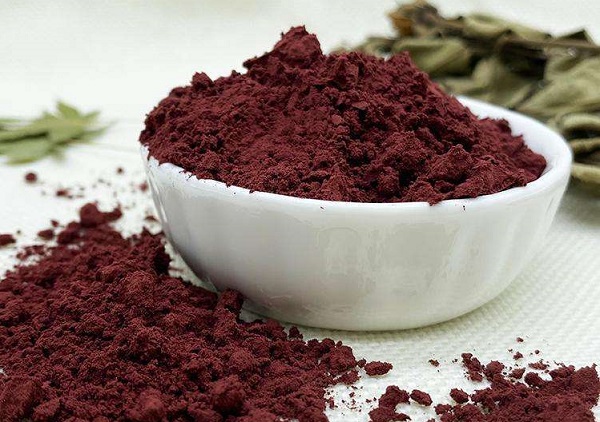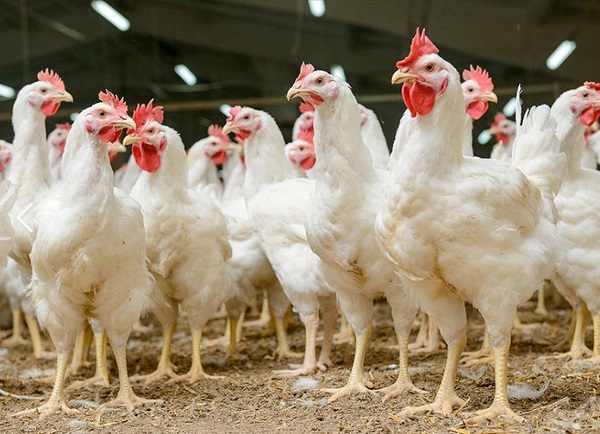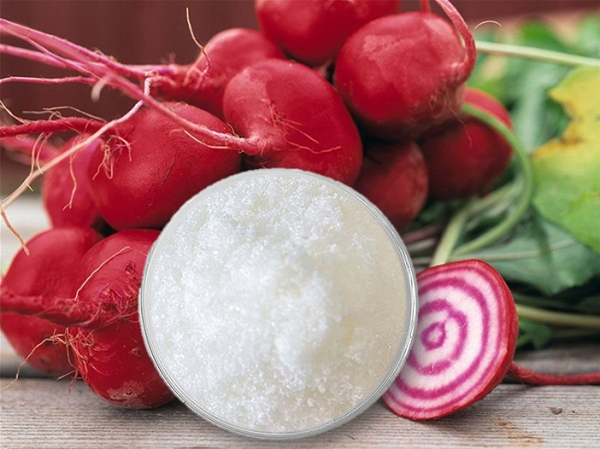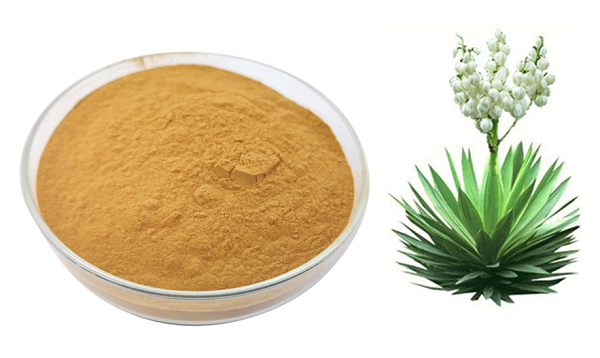Follow Us:
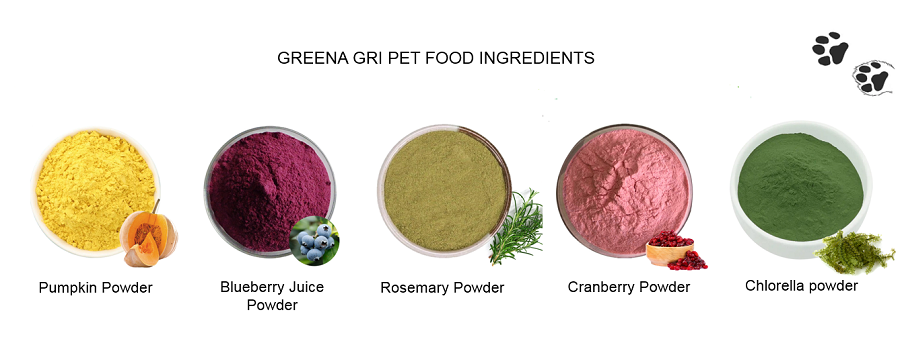
Pet Food Ingredient Supplier | Wet & Dry Nutrition Solutions
In the evolving pet food landscape, especially within the European market, pet owners are increasingly seeking products that offer more than basic nutrition. This demand has driven the growth of functional ingredients —components added to pet food to provide health benefits beyond fundamental nutritional requirements. These ingredients aim to support immunity, digestion, mobility, skin and coat health, and overall well-being in pets.
Pet food product form (dry kibble, wet food, soft chews, powder supplements, functional treats, etc.)
Target health functions (e.g. digestive health, skin and coat, joint support, calmness, weight control, urinary)
As a leading global pet food ingredient supplier, We manufacture a full range of wet and dry pet food ingredients in a variety of formats.
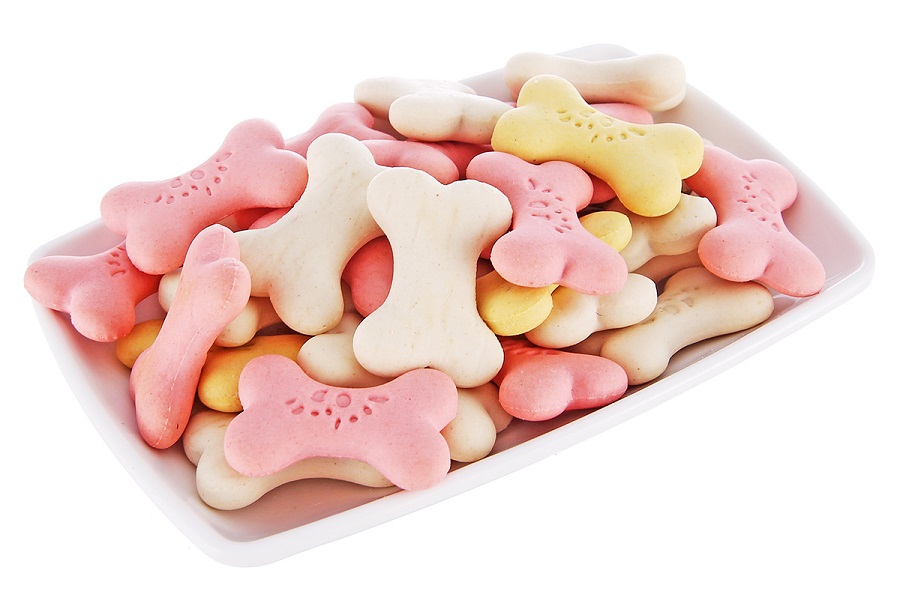
What Are the Functional Ingredients in Pet Food?
Pet food has several important functions that help maintain the overall health, well-being and longevity of your pet. These functions can be broadly divided into the following categories:
Nutritional Support
Pet food provides the essential nutrients, including protein, fat, carbohydrates, vitamins and minerals, that your pet needs to maintain normal body functions such as growth, energy production, immune response and organ health.
1. Plant Protein
- Soybean meal powder
- Pea protein powder
- Lentil flour
- Chickpea flour
2. Carbohydrates and fiber
- Carbohydrates provide energy and support digestive health
3. Grain-free alternatives
- Sweet potato flour, pea flour, tapioca flour
4. Fiber
- Pumpkin powder, psyllium husk powder
5. Fats and oils
Fats provide energy, enhance flavor, and support skin, hair, and brain health.
- Chicken fat
- Fish oil (rich in Omega-3 fatty acids such as DHA and EPA)
- Flaxseed oil
- Sunflower oil
- Coconut oil
6. Vitamins
- A, D, E, K, B vitamins, C
7. Minerals
- Calcium, phosphorus, zinc, iron, selenium, magnesium, copper
8. Functional additives
These ingredients provide specific health benefits in addition to basic nutrition.
- Probiotics and prebiotics: for gut health
- Glucosamine and chondroitin: for joint support
- Taurine: essential for heart and eye health in cats
- L-Carnitine: supports fat metabolism
9. Flavor enhancers and natural preservatives: improve taste and shelf life
- Seasonings: natural broth or fish stock, yeast extract
- Preservatives: mixed tocopherols (vitamin E), rosemary extract, citric acid
Growth and Development
Pet foods are especially suitable for young animals and promote healthy growth, bone development and muscle formation. Puppy and kitten formulas are often enriched with specific nutrients, such as DHA for brain development and calcium for strong bones.
1. High-quality animal protein
Chicken meal, fish meal, egg meal, lamb meal
2. Fish oil
DHA (docosahexaenoic acid) – Omega-3 fatty acid
3. Calcium and phosphorus
Calcium phosphate, bone meal
4. Antioxidants
Vitamin D3, Vitamin E
5. Prebiotics and probiotics
Prebiotics: Fructooligosaccharides (FOS), chicory root extract
Probiotics: Lactobacillus acidophilus, Bacillus subtilis
6. Essential amino acids
Taurine, lysine, methionine
Why Are Functional Ingredients So Important in Pet Nutrition?
For adult pets, a balanced pet food can help maintain their weight, muscle tone, and skin and coat condition. It also promotes a healthy digestive system and a strong immune system.
- L-Carnitine, Flaxseed Oil, Vitamin B7, Zinc Proteinate, Copper Sulfate, Retinyl Acetate (Vitamin A), Mixed Tocopherols (Vitamin E), Hydrolyzed Collagen, Green Tea Extract.
Disease Prevention & Management
Specialized pet foods help prevent or manage chronic diseases such as obesity, diabetes, kidney disease, and food allergies. Prescription foods are tailored to your pet’s specific health issues.
Dental Health
The texture of some dry pet foods helps reduce plaque and tartar buildup and aids in oral hygiene.
Digestive Health
High-quality pet foods contain fiber, prebiotics, and probiotics to support gut health and ensure efficient nutrient absorption.
Palatability & Satisfaction
Pet foods must be tasty to ensure your pet is full and meets their nutritional needs. Good palatability also promotes bonding between pet and owner during feeding.
Plant-based ingredients are increasingly being used in pet foods to provide functional health benefits, promote digestive health, and support formulation sustainability goals. These ingredients provide key bioactive compounds, fiber, antioxidants, and nutrients that contribute to your pet’s overall health.

The following is a curated list of commonly used functional plant-based ingredients in pet nutrition:
| Ingredient | Botanical Source | Functional Benefit | Recommended Inclusion | Typical Format | EU Compliance |
| Inulin | Chicorium intybus | Prebiotic – gut flora balance | 0.5–1.5% | Powder | FEDIAF-approved |
| Psyllium Husk | Plantago ovata | Fiber – stool quality, weight control | 1–2% | Powder, flakes | Clean label, GRAS |
| Green Tea Extract | Camellia sinensis | Antioxidant – immune support | 0.1–0.5% | Standardized extract | Polyphenols regulated |
| Turmeric (Curcumin) | Curcuma longa | Joint & inflammatory support | 0.2–1% | Powder, extract | Novel food limits apply |
| Chamomile Extract | Matricaria chamomilla | Anti-anxiety, calming | 0.1–0.3% | Powder, liquid | EFSA GRAS equivalent |
| Yucca Schidigera | Yucca schidigera | Stool & odor control, anti-inflammatory | 0.01–0.1% | Extract, Powder, liquid | Permitted additive |
| Rosemary Extract | Rosmarinus officinalis | Natural preservative, oxidative stability | 0.02–0.2% | Liquid, powder | Permitted antioxidant |
| Milk Thistle Extract | Silybum marianum | Liver detox & antioxidant | 0.05–0.2% | Standardized silymarin | Use with care, non-medical |
| Alfalfa | Medicago sativa | Protein & micronutrient source | 1–5% | Powder, meal | Widely accepted |
| Beet Pulp | Beta vulgaris | Fermentable fiber – digestive health | 2–5% | Dried pulp | Commonly used fiber |
| Fenugreek | Trigonella foenum-graecum | Appetite stimulant, blood sugar regulation | 0.1–0.5% | Powder, extract | Functional use growing |
| Cranberry Extract | Vaccinium macrocarpon | Urinary tract health, antioxidant | 0.1–0.3% | Powder, juice powder | Allowed in moderation |
| Licorice Root | Glycyrrhiza glabra | Anti-inflammatory, respiratory support | 0.05–0.2% | Powder, extract | Use in moderation |
| Seaweed (Kelp) | Ascophyllum nodosum | Thyroid & dental support, trace minerals | 0.1–1% | Powder | EU-approved for feed use |
| Flaxseed | Linum usitatissimum | Omega-3 ALA – skin, coat, anti-inflammatory | 1–5% | Whole, ground, oil | Common and accepted |
| Carrot Powder | Daucus carota | Beta-carotene, vision & antioxidant support | 1–3% | Powder, flakes | Clean label |
| Pumpkin Powder | Cucurbita | Soluble fiber – gut motility, stool regulation | 2–5% | Puree, powder, flakes | Functional fiber |
| Blueberry Extract | Vaccinium corymbosum | Antioxidant – brain, heart, and immune health | 0.1–0.3% | Powder, dried fruit | Permitted as flavorant |
| Spinach | Spinacia oleracea | Iron & lutein – eye and cellular health | 1–3% | Powder | Generally accepted |
| Nettle Leaf Powder | Urtica dioica | Anti-inflammatory, supports urinary health | 0.1–0.3% | Powder, dried herb | Functional in holistic diets |
- Dry and wet foods: fiber, flavor, natural colors, superfoods
- Functional treats: targeted botanicals like turmeric, ginger, parsley
- Nutritional powders: greens, adaptogens, and liver support blends
- Vegan/vegetarian pet diets: beans, seeds, and whole plant proteins
Special Plant Extracts with Potential for Clinical Use in Pets
| Plant Extract | Botanical Name | Primary Clinical Indication | Mechanism of Action | Typical Form | Clinical Notes / Status |
| Curcumin | Curcuma longa | Anti-inflammatory, osteoarthritis | Inhibits NF-κB pathway, COX-2 modulation | Standardized extract (≥95%) | Promising results in canine OA trials |
| Boswellia Serrata | Boswellia serrata | Joint inflammation, mobility support | Reduces 5-LOX enzyme activity | AKBA-standardized extract | Clinical trials in dogs show efficacy |
| Milk Thistle | Silybum marianum | Liver support, detox | Antioxidant, stimulates hepatocyte regeneration | Silymarin extract | Used in veterinary hepatoprotectants |
| Ashwagandha | Withania somnifera | Stress, anxiety, adrenal balance | Adaptogenic, reduces cortisol levels | Root extract (≥5% withanolides) | Early-stage pet supplement use |
| Valerian Root | Valeriana officinalis | Sedative, calming agent | GABA modulation | Root powder or extract | Often used in calming chews |
| Green Tea Catechins | Camellia sinensis | Cancer prevention, antioxidant | EGCG antioxidant and anti-proliferative action | EGCG extract (decaf) | Under study for cancer support in pets |
| Cannabidiol (CBD) | Cannabis sativa (hemp) | Pain, seizures, anxiety | ECS modulation (CB1/CB2 receptors) | THC-free oil or isolate | Under strict regulation in EU |
| Resveratrol | Polygonum cuspidatum | Anti-aging, metabolic support | Activates sirtuins, antioxidant | Pure extract (>50%) | Experimental in canine longevity |
| Quercetin | Found in Sophora japonica | Allergy, inflammation, immune modulation | Mast cell stabilization, antihistamine effects | Pure flavonoid extract | Shown to reduce itching in dogs |
| Berberine | Berberis aristata | Blood sugar regulation, gut health | AMPK activation, antimicrobial | Isolated alkaloid | Experimental in diabetic pets |
| Cranberry Extract | Vaccinium macrocarpon | Urinary tract health | Inhibits bacterial adhesion to bladder wall | PAC-standardized extract | Common in urinary health diets |
| Ginger Extract | Zingiber officinale | Nausea, digestive support | 5-HT3 receptor antagonist, prokinetic | Root extract or oil | Veterinary GI use emerging |
| Artichoke Leaf | Cynara scolymus | Liver & bile flow support | Stimulates bile production (choleretic) | Leaf extract | Used in hepatic supplements |
| Rhodiola Rosea | Rhodiola rosea | Stress resistance, cognitive support | Adaptogenic, modulates cortisol and serotonin | Root extract | Limited use in senior pet supplements |
| Maritime Pine Bark | Pinus pinaster (Pycnogenol®) | Joint health, antioxidant | Reduces oxidative stress, improves mobility | Standardized OPC extract | Studied in canine osteoarthritis |
Notes:
- Formulation Use: Many of these require encapsulation, chewable integration, or use in liquid supplements for palatability and compliance.
- Regulatory Considerations: Clinical claims must follow EFSA/FEDIAF guidelines; some may require novel food authorization or veterinary oversight.
- Trends: Increasing interest in polyphenols, adaptogens, and plant-based anti-inflammatories for senior, allergic, or anxious pets.

Essential Amino Acids in Pet Nutrition
| Amino Acid | Abbreviation | Key Functions in Pets (Dogs & Cats) | Dietary Requirement* (g/100g protein) | Special Notes (Cats vs Dogs) | ||
| Arginine | Arg | Detoxifies ammonia, supports immune & cardiovascular function | 5.1 (dogs), 4.2 (cats) | Cats have higher sensitivity to deficiency | ||
| Histidine | His | Hemoglobin synthesis, nervous system function | 1.0 (dogs), 1.5 (cats) | Important for auditory function | ||
| Isoleucine | Ile | Muscle metabolism, energy production | 0.9 (dogs), 1.2 (cats) | Supports lean muscle mass | ||
| Leucine | Leu | Protein synthesis, tissue regeneration | 1.7 (dogs), 1.6 (cats) | One of the most abundant BCAAs | ||
| Lysine | Lys | Collagen formation, calcium absorption, immune support | 1.5 (dogs), 1.2 (cats) | Often limiting in plant-based proteins | ||
| Methionine | Met | Precursor to taurine, antioxidant activity | 0.9 (dogs), 0.6 (cats) | Cats need more sulfur amino acids (see below) | ||
| Phenylalanine | Phe | Precursor to tyrosine, neurotransmitter function | 1.3 (dogs), 1.6 (cats) | Cats require Phe + Tyr higher than dogs | ||
| Threonine | Thr | Gut health, protein balance, immune function | 0.9 (dogs), 1.2 (cats) | Essential for mucin synthesis in intestines | ||
| Tryptophan | Trp | Precursor to serotonin and melatonin | 0.2 (dogs), 0.25 (cats) | Sensitive to heat processing | ||
| Valine | Val | Muscle growth, energy regulation | 1.1 (dogs), 1.2 (cats) | Part of the BCAA group | ||
| Taurine | Tau | Heart and eye function, bile salt conjugation | Not essential for dogs; 0.1% for cats | Essential for cats but not dogs | ||
Notes:
- Values are approximate minimums based on AAFCO and NRC recommendations.
- Cats have higher methionine, phenylalanine, and taurine needs due to obligate carnivore metabolism.
- Taurine is not a true amino acid by structure but is essential in feline diets and often supplemented in dog food under stress or illness.
Application in Pet Food
Growth formula: Emphasis on lysine, methionine, leucine
Weight management: Focus on branched chain amino acids (BCAA), such as leucine, isoleucine, valine
Senior pet food: Add taurine, glutamine, glycine to support heart and tissue
Hair and skin formula: cysteine, methionine, tyrosine, beneficial to hair health
UK
Market share: ~15% of the European pet nutrition market in 2024.
High pet ownership rates, high expenditure on high-end pet care, and a strong pet-humanization culture. UK pet owners are increasingly adopting preventive healthcare approaches, which has increased the adoption of pet nutrition products.
Germany
Market share: ~18.7% of the European pet care market in 2023.
Germany has the highest pet ownership rate in Europe, with huge demand for professional pet food, supplements, and health products. The market benefits from a strong network of specialty stores and veterinary clinics, which are the main distribution channels for pet nutrition and health products.
France
Market share: ~13.3% of the European pet care market in 2023.
France has a mature and well-established pet nutrition and health market, characterized by high consumer awareness and well-established distribution channels. French consumers show a strong preference for products with natural ingredients, which influences its product development and marketing strategies.
Italy
Market share: ~29% of EU pet food supplement sales in 2020.
Italy focuses on sustainability, with consumers valuing recycled materials and willing to pay a premium for sustainable products. Pet owners rely on veterinarians for dietary advice, which drives demand for functional pet ingredients.
Netherlands
Expected growth: The pet nutraceuticals industry will grow at an annual rate of approximately 12% between 2024 and 2029.
The Netherlands shows great potential, thanks to a significant shift in pet ownership patterns and changing consumer preferences. Dutch pet owners are increasingly favoring high-end and specialized pet nutrition products, especially in urban areas where the trend toward pet humanization is most pronounced.
Poland
Expected growth: The pet food market will grow at an annual rate of approximately 14% between 2024 and 2029.
The pet food industry in Poland is undergoing a period of transformation, thanks to shifting consumer preferences and the growing trend toward pet humanization. Polish pet owners are increasingly switching from traditional homemade pet food to commercial pet food, reflecting their growing awareness of their pets’ nutritional and health needs.
Spain
According to recent market reports, the Spanish pet food market has a compound annual growth rate (CAGR) of approximately 4-6%, with the functional and premium segments growing faster than the overall market. This trend is driven by the increase in the number of pet owners and the trend of consumers moving away from traditional nutritional products to more specialized, higher-value nutritional products.
At Greenagribio, We supply high-quality, functional ingredients for pet food and supplements—helping European brands deliver real health benefits to dogs and cats.
From amino acids and plant ingredients custom nutritional blends, our solutions support:
- EFSA compliance
- Functional claims (mobility, immunity, digestion)
- Brand differentiation
- Fast, reliable delivery.
- Full traceability.
- Formulation support you can count on.
Contact Us for Wholesale Orders
Whether you are sourcing ingredients for a new product line or scaling production, pet food ingredients supplier is your reliable factory partner for secure your stock of 25kg / 100kg / 500kg / 1000kg / 2000kg / 3000kg. Contact us today for technical specifications, samples, and bulk pricing.
Also See
- Wholesale Slippery Elm Powder Price In Australia—Pet food Ingredients Supplier
- Wholesale DL-Methionine Feed Grade Price Per Kg – High Quality for Dogs
- Wholesale Psyllium Husk Powder | Greenagribio Pet Ingredients Supplier
- Why Ascorbic Acid (Vitamin C) is in Pet Food Ingredients: Pet Food Suppliers
- Why Yucca Schidigera Extract Contain in Canned & Wet Pet Food: Bulk Pet Food Ingredients
- Wholesale Bulk Sea Moss Powder in Pet Ingredients: 80-200 Mesh
- Superfood Baobab Powder for Dog: Pet Food Ingredient
- Why Add Beta-Carotene (Vitamin A) Powder in Pet Food
- Mint Powder Breath Freshening Dog Treats: Pet Ingredient Suppliers
- Pet Food Ingredient: Bulk Ashwagandha Powder
- Why Oat Beta-Glucan Used as a Dietary Supplement for Pet
- Sweet Potato Powder For Dogs: Pet Food Ingredients Supplier













